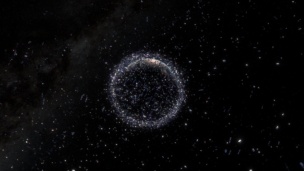The upper stage from a failed Russian space launch is expected to reenter the Earth’s atmosphere at some point today, Ars Technica reports.
The stage, Persei, deployed from an Angara A5 rocket and successfully performed an initial burn, but failed to perform a second burn out of four that would have delivered a dummy payload into geostationary orbit, per RT.
The details: The Angara 5 launch took off from the Plesetsk Cosmodrome on Dec. 27. This was the rocket’s third test flight and Persei’s first. The flight went according to plan up until the upper stage’s failed second burn.
- Dmitry Rogozin, director of Roscosmos, tweeted after the Dec. 27 launch that the organization was still waiting for Persei to deploy. (Spoiler alert…It didn’t.)
- As of this morning, Persei was at a ~140 km altitude as tracked by N2YO.
Don’t look up…Uncontrolled reentry has been a point of contention for the world powers in space (oxymoron?) of late. The Russian stage is smaller than rocket parts that have caused damage upon reentry in the past, and isn’t likely something to worry about. Small pieces of debris reenter the atmosphere almost daily—and burn up upon doing so. Larger craft reentering is where things can get risky.
In May, a 22.5-ton Long March 5B rocket reentered the atmosphere and fell into the Indian Ocean. Another Long March 5B reentry in May 2020 damaged homes in Cote d’Ivoire.
“Spacefaring nations must minimize the risks to people and property on Earth of re-entries of space objects and maximize transparency regarding those operations,” said NASA Administrator Bill Nelson in a statement following the most recent Long March reentry.





